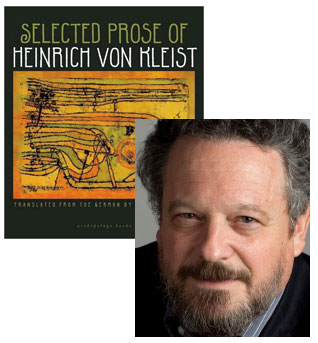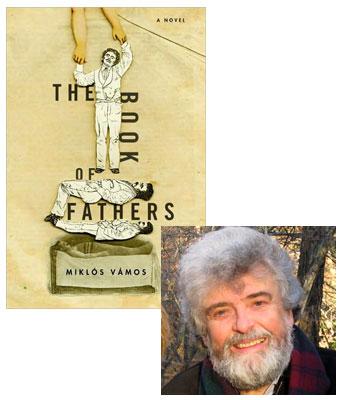Peter Wortsman & the Box-Sentences of Heinrich von Kleist

I’m looking forward to Selected Prose of Heinrich von Kleist, one of the most recent titles from Archipelago Books, an independent press dedicated to international translation—and my eagerness is stoked even higher by this description by Kleist’s translator, Peter Wortsman, of the effort to render Kleist’s intricate prose style into just the right English.
Unlike the stalwart scribes that comprise the dominant strain of German letters, giants like Goethe, Mann and Brecht, one-man classics factories who spew wisdom in every breath and make library shelves buckle under the sheer weight of their words, Heinrich von Kleist belongs to a parallel literary strain, a trembling class of German writers whose ranks include playwrights Jakob Michael Reinhold Lenz and Georg Büchner, enigmatic prose masters Franz Kafka and Robert Walser, and poet Paul Celan, to name a few. Their work—call it imperiled poetry, naked drama, or in Kleist’s case, self-destructing stories—puts its finger on the raw nerves of the real, sabotaging any pretense of certainty. Far from satisfying the reader’s need for assurance, Kleist’s stories still read today, 200 years after his death by suicide at the age of 34, like kamikaze attacks on the status quo.
Attempting to translate his prose is a rarefied, risky business akin to playing Russian roulette with a gold bullet, strolling over a half-frozen lake, or savoring blowfish sushi from which one is not altogether certain the chef has removed the deadly venom. The thrill of that lingering doubt naturally adds to the tingle, making every word all the more vital. Kleist played for keeps in everything he did, and every tempered sentence trembles with that sense of imminence transmuted from life into literature.
Having tackled other daunting stylistic challenges, including an English rendering of Robert Musil’s Posthumous Papers of a Living Author, now in its third edition (Eridanos, 1988; Penguin 20th-century Classics, 1993; Archipelago Books, 2006)—which, I am proud to note, was cited in the journal Modern Austrian Literature as “a kind of classic in itself”—I took on Kleist with mixed delight and trepidation. In the Musil translation, done more than 20 years ago, I had deemed it expedient to selectively subdivide his interminably long Teutonic sentences to appease an American predilection for syntactical simplicity. The result made Musil accessible to the contemporary English reader, while not, I hope, mutilating the essence. (Although a disgruntled Musil did appear to me in a dream, protesting what he called “schlamperte Arbeit,” a sloppy job.)
I have since come to the conviction that a sentence is a writer’s most intimate signature of self, that its structure follows the fault lines of the psyche that shaped it and should not, except in rare cases in which not to do so would obfuscate meaning, be tampered with in translation. This is particularly true of the Kleistian so-called “Schachtelsatz,” (box-sentence), a painstakingly constructed, airtight narrative nugget with a grain of truth at the core, around which he built his stories, layer upon layer, the way an oyster salivates pearls around a grain of sand. Disinclined to undue haste, the 19th German mindset took its sweet time in the telling, often getting tangled in subordinate clauses and occasionally losing its thread along the way, but Kleist always pulls it off with the surefootedness of a sleepwalker on an internalized tightrope.
Or to bend the metaphor, with his finger on the thread of Ariadne, Kleist took frequent strolls in a psychic labyrinth of his own confection, unafraid to meet, indeed courting the Minotaur within. He can no more be blamed for the convolutions of his narrative thread than can the Grimms’ Märchen hero Hans be blamed for strewing bread crumbs when he ran out of white pebbles. That was the only way out.
3 February 2010 | in translation |
Peter Sherwood, Breathing in the Language of Miklos Vamos’ Book of Fathers

If you saw The New Yorker‘s brief notice this week of Miklós Vámos’s The Book of Fathers, which describes the novel as “a unique and affecting illustration of the vicissitudes of Hungarian history,” perhaps you wanted to learn more. You’re in luck—translator Peter Sherwood was kind enough to send us this short essay about Vámos and Hungarian literature. I’m looking forward to reading it later this month—in the meantime, Prof. Sherwood let me look at a short story by Dezs Kosztolányi he’d translated recently, so I know the Vámos should be excellent reading.
“A novel” it says on the eye-catching cover, but Miklós Vámos’s The Book of Fathers is a highly readable saga spanning the last three centuries of Hungarian history, so perhaps a brief introduction won’t come amiss. Quite unrelated to the languages around it, Hungarian, together with its speakers, has nevertheless been an integral part of Europe for more than 1100 years. This context provides not only the setting for Hungary’s extraordinary history—which vastly overflows its contemporary borders—but also the tension that drives Hungarian culture and my lifelong interest in it.
Though language is nowadays widely accepted as the touchstone of national identity, Hungarians have long been intensely aware of the isolation and distinctiveness of their tongue—both a plus and a minus, often at the same time —and have always particularly prized its embodiment in literature as their highest cultural value. As writers have regrouped over the last two decades and cleansed the language of the mire of Communistspeak, acceptance of the best-known contemporary literary personality Péter Esterházy’s dictum that “it is better for the writer to think in terms of ‘subject’ and ‘predicate’ than ‘people’ and ‘nation'” has increasingly meant that a number of Hungary’s most outstanding writers speak to the whole world, even as they often (paradoxically) try to exorcise the Hungarian past and mine linguistic registers unexploited under even soft Communism. Only a few of their works are available in English translation, and not all of these do justice to the originals; and even those that do, give only a hint of the enormous range and vitality of Hungarian literature in our time.
4 December 2009 | in translation |

 Our Endless and Proper Work is my new book with Belt Publishing about starting (and sticking to) a productive writing practice.
Our Endless and Proper Work is my new book with Belt Publishing about starting (and sticking to) a productive writing practice. 
